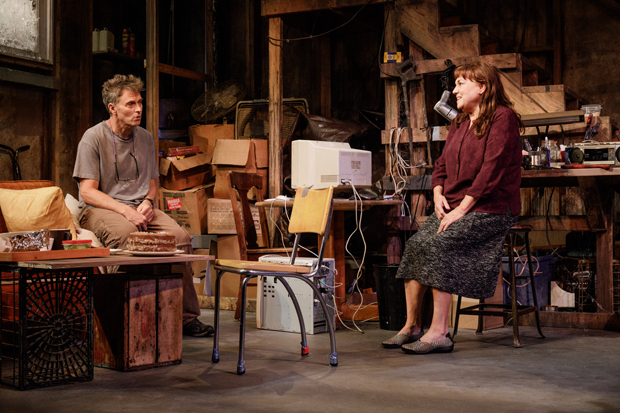Tyne Daly and Tim Daly Play Against Type in Theresa Rebeck's Downstairs

(© James Leynse)
In careers spanning decades, siblings Tyne and Tim Daly have taken on roles that fall into distinct categories. Whether as Lacey or Madame Rose, Tyne is known for playing badass, headstrong women. Tim is known for playing handsome leading men on TV series like Madam Secretary and Private Practice. So when Tim tasked dramatist Theresa Rebeck with writing a play for him and his sister to star in, Rebeck responded by creating a work that casts them so far against type that they're barely recognizable.
Welcome to the world of Downstairs, a wannabe thriller presented by Primary Stages at the Cherry Lane Theatre. In the play, the Dalys play siblings Irene, a perma-smiling housewife overwhelmed by her wifely duties, and Teddy, a vagrant overwhelmed by life and losing his grip on reality. Teddy is convinced he's being poisoned at work, so he's holed up in Irene's basement. What starts as a pleasant-enough reunion naturally unearths the effects of two people who have spent years trying to forget an abusive, alcoholic mom and a dad who abandoned them. They also contend with ill will from Gerry (John Procaccino), Irene's abusive husband, who breathes down their necks from the first floor.
Nothing is what it seems, and yet, everything is what it seems. Downstairs simply isn't clever enough to pull off the theatrical trickery it valiantly wants to achieve, starting as a bland dysfunctional family drama about mental illness, turning into a mystery for two good scenes, and then returning to its initial instincts. It sinks under the weight of exposition that's delivered in a flurry of words as opposed to methodically planted bits of information. The use of a MacGuffin in the form of a broken computer (…or is it?) is particularly frustrating.
But the play is only half the problem. The other half is Adrienne Campbell-Holt's limp staging, which feels as though it's still sleeping off an all-nighter and refuses to be awakened. To wit, the world of the piece brims with disparate parts. Narelle Sissons's ultra-realistic set resembles all of our grandparents' unfinished basements (complete with ugly '50s furniture), while the costumes and lighting (by Sarah Laux and Michael Giannitti, respectively) feel artificial. M.L. Dogg provides a strangely good-humored score of interstitial music, while Tyne's wig, designed by Leah Loukas, doesn't even seem to fit her head properly.
The characters aren't natural fits either, but Tyne is such a skilled performer that she can make any role seem believable through body language, a few stammers, and sheer force of will. Tim, on the other hand, has the unfortunate task of playing a plot device. No one could do it successfully. At least their sibling chemistry shines through.
Oddly enough, it's Procaccino who fares best in an equally synthetic role, a villain culled from the worst traits of Oscar Madison, Ralph Kramden, and Jeffrey Dahmer. In short, he's a straight white man, which is, today, the scariest antagonist of all. Whatever's happening in his part of the house is far more exciting to think about than anything going on downstairs.










